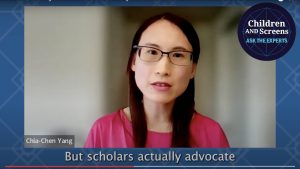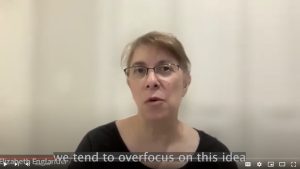
Chia-Chen Yang, PhD (Associate Professor of Educational Psychology, Oklahoma State University), advocates for a parenting approach that centers conversation and media literacy rather than screen time conrols at #AskTheExperts webinar “(dis)Connected? Relationships in the Digital Age” on November 9, 2022.
[Dr. Chia-Chen Young] And that’s also one question I have for parents when they come to me and say, “How do I limit children’s screen time?” My first question would be, “Why would you like to limit their screen time?” I’d like to start by introducing the idea called “parental mediation.” So that means parents getting involved in children’s technology use and help them use it more wisely. And there are at least two types of strategies. One is restriction, so limiting screen time, and the other is active or enabling mediation. So that means I’m talking to teens about what types of use is healthy? What can bring you risk? When you encounter unpleasant information, how do you deal with it? And so on, so forth. And a lot of times our conversation focuses on restriction. But scholars actually advocate for a balance between two. And so my response to that would be, “Have you seen warning signs?” If you have seen signs that you are concerned about, for example, they are emotionally disturbed, they’re not catching up with schoolwork, they’re not sleeping, their diet is changing, and so on and so forth. If they’re not seeing the signs then maybe focus on active or enabling strategies, but if they’re seeing warning signs, talk to teens. Tell them, “I really think you should reduce your use, because here are the negative signs I’m seeing.” I think the conversation needs to start there and we need to make sure that teens also agree upon that. I don’t know how they’re going to respond, but if they don’t agree that there is a problem, they don’t think it’s interfering with their life routines, they’re not going to be motivated to reduce their use.
View the Full Webinar

PITR, IKR?: Youth and Communication in the Digital Age
The latest research (and perspectives from teens themselves) on trends in youth digital communication and tips for creating positive and connection-centered communication online or offline.
Ann Cameron, PhD
Honorary Emerita Professor of Psychology; Emerita Professor
Sherry Turkle, PhD
Abby Rockefeller Mauzé Professor of the Social Studies of Science and Technology; Founding Director, MIT Initiative on Technology and Self
Sebastian Wachs, PhD
Deputy Professor for Education and Socialization Theory; Honorary Research Fellow
Richard Guerry
Founder and Executive Director





